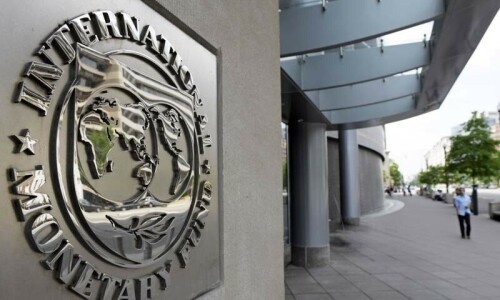WE have all seen the filmstrip, a bed strewn with pillows, a shelf of cough syrups, a small kerosene stove and of course the bloody floor … the vestige of a final unseen encounter.
Other snips and shreds add to the picture, the young boy who played with the Bin Laden children, the neighbour who saw the comings and goings of the elusive clan, the wife who never left the top floor.
There was another house in Haripur we are told; they had been living there for five years it is asserted. From these fragments, the end of the world’s most wanted man is to be constructed, a man that killed thousands but who instructed his own children to not join Al Qaeda, a man who leered at America for its imperialist sins but unthinkingly condemned Pakistanis to pay for them.
Osama Bin Laden chose a good place to die — a place where truth and history are constructed with imagination and passion nearly always defeats the facts.
Even as Pakistani television channels rant and rave at the lack of official statements on the incident, a public which is used to the manufacture of explanations has already produced what the government cannot. The whole thing was staged, one cadre will tell you, there was no Osama and no killing, they will insist. Where is the body and where is the picture they will question.
Others will present a slightly varied version; more accommodating of the truth, adding elements that would preserve their lifelong faith in the invincibility of the Pakistani military, of the omniscience of its intelligence agencies.
Their version portends that the leadership of both these institutions knew of Osama bin Laden’s presence; some even say that he was delivered to the Americans, that Osama was lured to Abbottabad, the Americans tipped off by our superior sleuthing skills. Pakistanis, they will insist, played a crucial part in delivering to the Americans the victory they had so longed for.
Pakistan’s television hosts and experts, self-appointed oracles benevolently offering the populace a smorgasbord of inspired truths, have by now weighed the value of several of these narratives, adding a bit here, trimming a bit there.
However, contrary to their estimations, it is not the facts of Osama’s death or the question of whether Pakistani authorities were complicit or ignorant that is of crucial importance here. The revelations that emerge lie not in the actualities that elude us but in the fictions that Pakistanis have constructed to explain their absence. If anyone wishes to discern the infamous causes of our decline or the dynamics of our diseased existence, the answers lie in the fictions we have created while scratching our heads and maligning our leaders.
The first of these and the most obvious is the central belief in the gleaming aptitude of our military capabilities. The alternating decades of military rulers, the orderly lawns we can glimpse inside messes, the parade of missiles we like to salute a few times every year have cultivated a belief that the military actually works; that unlike the rest of everything beaten and broken, there are rules, procedures, perhaps even competence.The stories we are making up now, the fact that they probably knew, no they must have known, or yes, they surely did know point to our inability to let go of precisely this myth. The idea that this one institution that has imposed itself on the Pakistani people could also be, like the rest, decrepit and somewhat inept is too formidable a burden to bear, a truth even more indigestible than that of Bin Laden’s unglamorous end.
Our theories expose not simply political and institutional truths, but also social ones. Again and again, the ordinary folk of Abbottabad and Haripur have scratched their heads before television cameras. As one villager in Haripur put it: “We know each other, we go visit one another’s homes … no one can live here and not go unnoticed.”
Such anecdotes, variously worded, are reproduced in a sad cycle, each one poking holes in a disliked reality — that Osama really was there among them or that he was actually killed.
This collective mantra of denial upholds another myth nourished over the decades; that Pakistan is a deeply connected society, that everyone knows their neighbours, that the bonds of community eliminate the possibility of anonymity. But just as the fable of the vanguard all-defeating fighting force has been shaken, so too must the idealised image of a closely bonded community sustained by neighbourly bonds.
The Pakistan that exists, whether it is the village in Haripur, the house in Abbottabad or any old neighbourhood in Karachi or Lahore, has few such idyllic communities. Neighbours are increasingly strangers, everyone has some stash of secrets they would like to preserve, and most just don’t want the burden of neighbourly evaluations. In the Pakistan of today, the desire to be left alone trumps any straggling wish to know or be known.
Conspiracies are constructed when the truth fails, when the narrative arc of reality does not deliver either the drama or the truth that our instincts demand. The account of Osama bin Laden is no different; the fact that he would be living so close to a military installation that he could go undetected and then be summarily eliminated is an assault on Pakistan’s picture of its military and of the people’s account of themselves. And so, in an effort to defeat their own helplessness, Pakistanis will create stories, pushing against the gaps and making them wider, while revelling in the ambiguity that makes alternative beliefs possible.
The burial at sea, the night-time attack, the lack of pictures and the political gains of the Obama administration all becoming instruments in the painstaking efforts to remain faithful to the truth we want rather than the one we have.
The writer is a US-based attorney teaching constitutional law and political philosophy.








































Dear visitor, the comments section is undergoing an overhaul and will return soon.